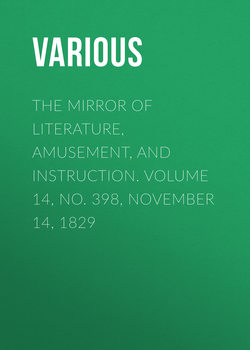Читать книгу The Mirror of Literature, Amusement, and Instruction. Volume 14, No. 398, November 14, 1829 - Various - Страница 2
RETROSPECTIVE GLEANINGS
ОглавлениеTOUCHING FOR THE CURE OF THE KING'S EVIL
(For the Mirror.)
The author of a treatise on this subject, tells the following anecdote, which may in some degree account for the numbers registered at Whitehall, (who were touched) which were from the year 1660 to 1664 inclusive, a period of five years, 23,601; and from May 1667 to May 1684, 68,506; viz. an old man who was witness in a cause, had by his residence fixed the time of a fact, by Queen Anne having been at Oxford, and touched him while a child, for the cure of the evil. When he had finished his evidence, the relater had an opportunity of asking him whether he was really cured. Upon which he answered with a significant smile, "that he believed himself never to have had a complaint, that deserved to be considered as the evil, but that his parents were poor, and had no objection to the bit of gold."
When King Charles II. touched at Whitehall, he usually sat in a chair of state, and put about each of their necks a white ribbon, with an angel of gold on it. Query.—Was not this the original golden or angelic ointment?
Edward the Confessor is generally mentioned as the first possessor of this art; although the historians of France are disposed to maintain, that it was originally inherent in their kings.
Dr. Johnson's mother is said to have been instigated by the advice of a celebrated physician, Sir John Floyer, to bring her son to London for the purpose of receiving the remedy, and it is recorded that he was touched by Queen Anne.
P.T.W.
ADMINISTRATION OF JUSTICE AMONG THE EGYPTIANS
(For the Mirror.)
The Egyptians were exceedingly exact about the administration of justice, believing that the support or dissolution of society altogether depended upon that. Their highest tribunal was composed of thirty judges. They placed at the head of this tribunal the person who at once possessed the greatest share of wisdom, knowledge, and love of the laws, and public esteem. The king furnished the judges with every thing necessary for their support, so that the people had justice rendered them without expense. No advocates were allowed in this tribunal. The parties were not even allowed to plead their own causes. All trials were carried on in writing, and the parties themselves drew up their own cases. Those who had settled this manner of proceeding well knew that the eloquence of advocates very often darkened the truth, and misled the judge. They were unwilling to expose the ministers of justice to the deceitful charms of pathetic, affecting orations. The Egyptians avoided this by making each party draw up the statement of his own case in writing, and they allowed a competent time for that purpose.8 But to prevent the protracting of suits too long, each party was only allowed one reply. When all the evidence necessary for their information was given to the judges, they began their consultation. When the affair was thoroughly canvassed, the president gave the signal for proceeding to a sentence, by taking in his hand a little image adorned with precious stones, which hung to a chain of gold about his neck. This image had no eyes, and was the symbol with which the Egyptians used to represent Truth. Judgment being given, the president touched the party who had gained the cause with this image. This was the form of pronouncing sentence. According to an ancient law, the kings of Egypt administered an oath to the judges at their installation, that if the king should command them to give an unjust sentence, they would not obey him.
8
All this must be understood with some limitations, otherwise we must suppose that all the inhabitants of Egypt had not only learned to write, but that they had sufficient talents and knowledge of the laws, to draw up their own defences, which is not to be supposed. This law then must have been liable to some exceptions and modifications. We must say the same thing of other countries where they tell us there are no advocates, and that all trials are carried on in writing, as in Siam, China, Bantam, &c. Origin of Laws, G.M. Gognet.
